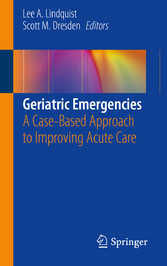Suchen und Finden
Service

Geriatric Emergencies - A Case-Based Approach to Improving Acute Care
Lee A. Lindquist, Scott M. Dresden
Verlag Springer-Verlag, 2019
ISBN 9783030124144 , 214 Seiten
Format PDF
Kopierschutz Wasserzeichen
Geräte
Care for older adults in Emergency Departments (EDs) has historically been focused on acute medical conditions with little emphasis on geriatric-specific issues. In 2010, emergency departments (EDs) throughout the nation saw almost 130 million patients, 15% of whom were 65 or older. The number of older adults who visit an ED has doubled in the last decade and continues to grow rapidly. Older adults receiving care in an ED are highly likely to be admitted to the hospital, much more so than their younger counterparts. Preventing a hospital admission saves older adults from frequently encountered adverse events, including hospital-acquired delirium, functional status impairment, cognitive loss, and nursing home admission.
It is unknown how many older adults are hospitalized for reasons other than acute medical illness, such as functional decline, polypharmacy, progressive dementia, caregiver stress, or unstable living situation. These non-emergent conditions are rarely addressed during a typical ED visit due to lack of resources, significant patient volumes, and the need for rapid turnover of care spaces. The predominant management strategy of emergency physicians to handle these important but not imminently life-threatening geriatric issues is to recommend hospital admission.
Northwestern has pioneered the Geriatric Emergency Department through the creation of the Geriatric Emergency Department Innovation model (GEDI), with goals to prevent admissions for older adults by assessing and meeting their geriatric-specific, non-acute care needs in the ED. The GEDI model at Northwestern centers on a multi-disciplinary curriculum composed of clinical, didactic, and practical arms developed by emergency medicine and geriatrics educational experts.
In this title, we will present case studies of older adults seen in the Emergency Department through the GEDI model and discuss means of identifying/screening for, diagnosing, and treating geriatric syndromes seen in the emergent care of the older adult patient. In addition, there will be a set of concise 'take-home points' for each case study that will be easy to commit to memory and implement in clinical care of older adults.
As the number of seniors seeking emergent care will continue to increase, the ED setting must become responsive to geriatric-specific needs. This book will provide a variety of models detailing how to offer comprehensive, state-of-the-art, optimal care for managing the full range of geriatric syndromes that regularly present in the emergent care setting.
Lee A. Lindquist, MD MPH MBA
Associate Professor of Medicine
Section Chief of Geriatrics
Northwestern University Feinberg School of Medicine
750 N. Lake Shore Drive, 10th Floor
Chicago, IL 60611
Scott Dresden, MD
Assistant Professor of Medicine
Department of Emergency Medicine
Northwestern University Feinberg School of Medicine
211 E. Ontario, Room 200
Chicago, IL 60611
Shop


